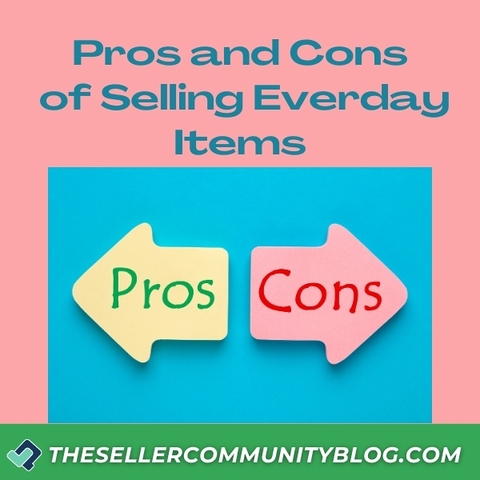Estimated reading time: 3 minutes
If you’ve ever considered diving into the world of reselling, you might have found yourself drawn to everyday products. After all, these items are always in demand, right? But like any business venture, reselling common goods comes with its own set of advantages and challenges.
Whether you’re a seasoned seller or just starting out, understanding these pros and cons can help you make informed decisions and set you up for success in the reselling game.

Pros
High demand
Everyday products often have a consistent and high demand since they are necessities.
Repeat customers
Selling everyday items can lead to repeat purchases, building a loyal customer base.
Broad market
The target market for everyday products is vast, increasing the potential customer base.
Price stability
Common products typically have stable prices, making market predictions more manageable.
Ease of sourcing
Everyday products are generally easier to source from wholesalers or manufacturers.
Lower cost per item
Buying in bulk often allows for a lower cost per unit, improving profit margins.
Quick inventory turnover
Due to high demand, everyday items tend to sell quickly, keeping inventory fresh.
Simplicity
Products that are used daily are usually simple to market and require less customer education.
Seasonal independence
Everyday products are often needed year-round, providing consistent sales.
Flexible sales channels
These products can be sold on multiple platforms without restriction on niche markets.

Cons
Low margins
High competition often leads to lower profit margins as sellers try to undercut each other’s prices.
Intensive competition
Many resellers might target everyday items, making the market highly competitive.
Storage requirements
Storing bulk quantities of everyday products can require significant space and proper logistics.
Generic products
It can be challenging to differentiate your offerings when many similar products are available.
Market saturation
Popular product categories can become quickly saturated, making it hard to stand out.
Price wars
Competitors might engage in price wars, which can erode profits and destabilize the market.
Limited upsell opportunities
Everyday items often have fewer opportunities for upselling more expensive products.
Customer price sensitivity
Buyers often seek the lowest price for everyday items, influencing loyalty.
Regulatory concerns
Certain products may face regulatory issues or recalls that could affect your business.
Dependency on suppliers
Relying on suppliers for inventory can be risky if supply disruptions occur.

Recommendations for resellers
Focus on niche markets
To avoid intense competition, focus on niche segments within the everyday products category.
Leverage bulk discounts
Work closely with suppliers to secure bulk discounts that allow competitive pricing while maintaining reasonable margins.
Optimize listings
Ensure your product listings are optimized with accurate descriptions and SEO-friendly keywords to attract more traffic.
Implement smart pricing strategies
Use dynamic pricing tools to stay competitive without engaging in damaging price wars.
Enhance customer experience
Differentiate yourself by offering excellent customer service, fast shipping, and a user-friendly return policy.
Reselling everyday products can be lucrative but requires strategic planning and execution to overcome the inherent challenges of the highly competitive market.




